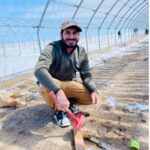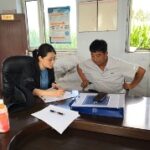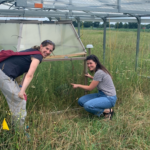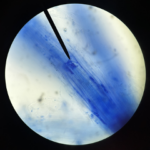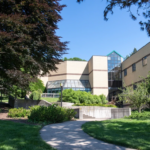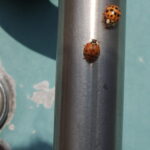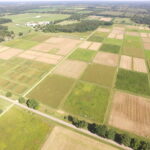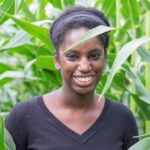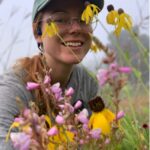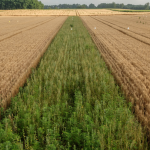Goutham Thotakuri is a graduate student in the Kravchenko lab at Michigan State University. His research is focused on the study of carbon transfer between various cover crop species and soil carbon sequestration. Recent changes to our climate dynamics have brought on alarming drought conditions in many parts of the world. Since we cannot control the climate, we need to prepare our agricultural systems for adversity. One way to do this is through understanding the soil's hydro-physical and biochemical processes. We can identify critical factors influencing drought resilience by
Exploring the effects of multiple crises on the global food trade system: Reflections from an LTER Fellow
Nan Jia is a graduate student at Michigan State University's Center for Systems Integration and Sustainability, Department of Fisheries and Wildlife, and Environmental Science and Policy Program. Her PhD research seeks to uncover how the multiple crises affect global food trade system dynamics. She worked closely with Jack (Jianguo) Liu and members of the lab to reveal the impact of different crises on different stages of trade such as production, handling, transportation, and consumption by using production data, trade data, supply chain data, and consumption data. The interactions between
Trials and tribulations of a PhD student: Reflections from an LTER Fellow
Moriah Young is a graduate student at the Kellogg Biological Station and a member of Phoebe Zarnetske's Lab. Her PhD research seeks to understand the effects of climate change on soil biota, plant, and herbivore interactions. Using a combination of field and greenhouse studies, Moriah works to understand the ways in which the composition and structure of soil microbial communities respond to warming and drought, as well as describing the role that the soil microbial community has on plant traits, stress responses, and insect preferences in the presence of warming and drought. I went into
Pools of phosphorus across the LTER: Reflections from an LTER Fellow
Ethan Weinrich is a graduate student in MSU's Department of Plant, Soil and Microbial Sciences, advised by Sieg Snapp. The Challenge Soils contain the largest pool of phosphorus on Earth. Yet, farmers need to add phosphorus to their fields to help crops grow. This is called the Phosphorus Paradox: there is so much phosphorus in soils, yet plant growth is limited by this nutrient. The tricky part is that most of the phosphorus in soils is locked away in forms not available to plants. How can plants access the phosphorus they need to grow? Phosphorus minerals in soil can be broken
KBS commitment to to fostering an inclusive culture garners accolades from MSU
W.K. Kellogg Biological Station’s dedication to making diversity, equity, inclusion and social justice central to KBS culture has earned an Excellence in Diversity, Equity and Inclusion unit award from Michigan State University. The award focuses on the work of the KBS Culture and Inclusion Committee, or CIC, and its 2022 membership: Among the examples of KBS’s contributions to advancing diversity, equity and inclusion were the formation of the CIC, a focus on diverse hiring and recruitment practices, creation of a DEI advocate position, and the development of programming aimed at
Similar invasive insects coexist through slight differences in environmental responses
Novel analyses of a 31-year dataset on invading ladybeetles shows that small differences in habitat preference across years allow for two similar invading species to coexist while native species decline. Invasive species lead to novel interactions Invasive species are one of the main threats to biodiversity in an increasingly interconnected world. As humans move organisms around, either purposefully or incidentally, new combinations of species have the opportunity to interact with one another. These novel interactions have the potential to affect an invader’s persistence in the
KBS Long-Term Ecological Research program awarded $7.65 million NSF grant
The W.K. Kellogg Biological Station Long-Term Ecological Research program at Michigan State University recently received a renewal of its foundational grant from the National Science Foundation, reaffirming its future and status as one of the country’s premier research sites. Established in 1989, the KBS LTER is one of 28 NSF LTER sites nationally and is the only one dedicated to understanding the ecology of agricultural systems. With a focus on row crops, the 34-year-old program studies how agriculture can be environmentally friendly without harming yields. A renewal
Article featuring KBS research wins outstanding paper award
A paper that examines best practices for improving soil health over time has been recognized as outstanding by the American Society of Agronomy, or ASA. The paper, spearheaded by W.K. Kellogg Biological Station resident faculty and MSU assistant professor Christine Sprunger, detailed research that was conducted at the KBS Great Lakes Bioenergy Research Center site. Tvisha Martin and Meredith Mann also contributed to the paper, titled “Systems with greater perenniality and crop diversity enhance soil biological health,” which was originally published in 2020 in the journal Agricultural
The ABC’s – Agriculture, Beneficial Beetles and Conservation: Reflections from an LTER Fellow
Cynthia Fiser is a graduate student in Doug Landis's lab in the Michigan State University Department of Entomology. Her research looks at the impact of perennial prairie strips on the dispersal of ground beetles in row crop agriculture. Rolling hills of wheat, corn and soybean are a beautiful and nostalgic feature of the summer landscape in the Midwest. Here, agriculture is as much a part of the culture as the economy – anyone who attends a county fair would agree! However, the pressure placed on our agricultural landscapes to meet global demands for food, fuel and fiber takes a toll on
Little strips of prairie can go a long way
New research out of MSU shows that it is possible to manage farmland to address two challenges simultaneously – protecting biodiversity and maintaining ecosystem services. The key is to strategically place native perennial vegetation within agricultural systems, using the innovative practice of prairie strips. Today, 38% of the landscape in the Midwest is planted in row crop agriculture. “We need to make this land habitable for species for the ecosystem services the increased biodiversity can provide to the farms” said Lindsey Kemmerling, the first author of the MSU-led study
- 1
- 2
- 3
- …
- 11
- Next Page »
